English Words in Action, Group T
(a variety of English words which have developed through history and are currently used in our modern age)
Simply click on this banner (or the following link) and you will be on your way to stimulate your brain for greater word comprehension with quizzes based on some of the words in this unit.
2. The parts of wheels or tires that make contact with roads or rails and which are without patterns of ridges, or grooves, and that are non-existent on tires: It is very dangerous to drive a car with treadless tires because it is much easier to slip or to slide out of control.
The treadmill was invented and named in 1822 by William Cubitt of Ipswich, England; and it was originally an instrument used for prison discipline.
2. A similar exercise mechanism that is operated by quadrupeds; such as, horses: The dog owner had a treadmill for her dog so it could get more exercise in the city apartment.3. A boring or tiring activity, job, etc., in which a person repeatedly does the same things again and again: The office treadmill and the treadmill of exhausting family schedules made it necessary for Aileen to go on a vacation.
Gavin was getting tired of working on the project treadmill because no matter how much effort he and the others put into it, nothing was being accomplished.
4. A system consisting of a large wheel with steps fitted into its inner surface which was formerly used for operating machinery: Some previous treadmills were turned by the weight of people who were treading on steps so the equipment could manufacture products.As a reporter, Debora was known to have trenchant writing skills.
2. Etymology: from Old French trenchier, "to cut, to be incisive."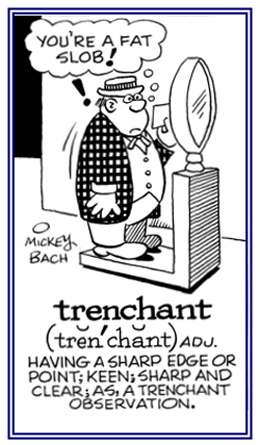
Go to this Word A Day Revisited Index
so you can see more of Mickey Bach's cartoons.
2. Etymology: from Latin truncare, "to lop"; from French tranchoir; from trenchier, "to cut, to carve" + Old English mann, "human being, a person, a man".
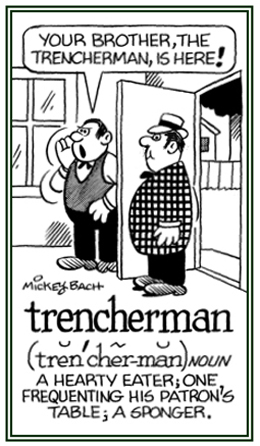
Go to this Word A Day Revisited Index
so you can see more of Mickey Bach's cartoons.
2. A way of behaving or proceeding which is developing and becoming more common: The trends of the stock market are up sometimes and then they are down at other times.
Digital technology is the current trend in television.
Many teachers are trying to reverse the general trend of lower test scores in schools.
His trend against hiring more workers is a result of receiving lower profits.
3. In medicine, the inclination to proceed in a certain direction or at a certain rate: Helena's doctor explained his recommended trend for the healing of her illness.2. To bend or to turn away in a specified course: The Severn River trends toward Lake Ontario.
3. To show a tendency or movement toward something or in a particular way: Public opinion is trending against being involved in another war.
Unemployed people have trended toward frustration and hopelessness because they can't find a way to take care of themselves financially.
4. To extend, to incline, or to veer in a specified course: The prevailing wind in the weather forecast trends toward the east.According to some people, the gender gap seems to be trending down.
5. Etymology: "to run" or "to bend in a certain direction"; developed from Middle English trenden, "roll around, turn, revolve"; found in Old English trendan, related to trinda, trinde, "round lump, ball", and trendel, "circle, ring, disk"; derived from the same word in the ancestral language of Old Frisian trind, trund, "round"; then Middle Low German trendel, "disk, spinning top" which is Trendel in modern German.2. Reflecting the latest fad by deliberately reflecting or adopting fashionable, often faddish, ideas or tastes: More and more people have become part of the trendiest mobile phone systems than ever before.
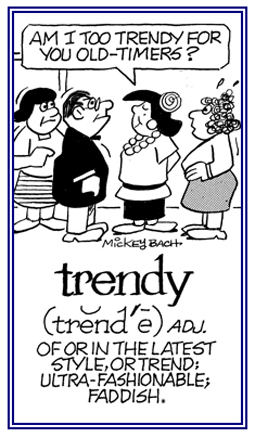
Go to this Word A Day Revisited Index
so you can see more of Mickey Bach's cartoons.
2. Etymology: from Greek trypanon and Latin trepanum, an archaic term that literally meant, "a borer" which was a surgical intervention in which a hole was drilled or scraped into the human skull, exposing the thick membrane made of dense irregular connective tissue that surrounds the brain and spinal cord to treat health problems related to intracranial diseases or to release pressured blood buildup from an injury.
Supposedly, in ancient times, holes were drilled into people who were behaving in what was considered an abnormal way in order to let out what was believed were evil spirits.
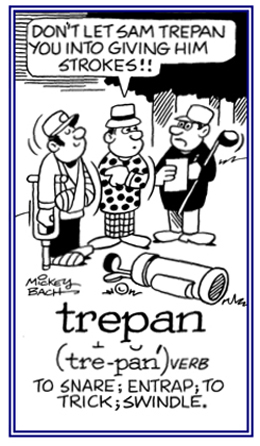
Go to this Word A Day Revisited Index
so you can see more of Mickey Bach's cartoons.
2. Etymology: from Latin tribunal, "raised platform provided for magistrate's seats", from tribunus, "an official in ancient Rome, a magistrate," literally "head of a tribe."
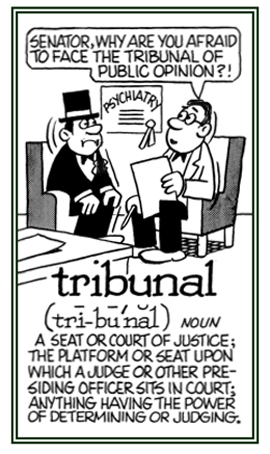
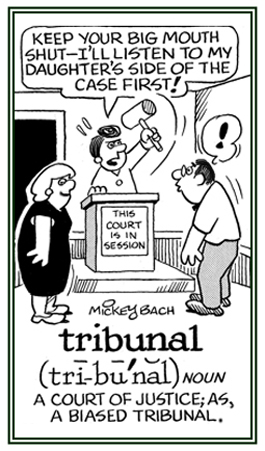
Go to this Word A Day Revisited Index
so you can see more of Mickey Bach's cartoons.
There has been an uneasy truce between Beth and her parents for the last several months about her marriage to a foreign worker.
Someone has said that a truce is when shouting or yelling replaces shooting.
2. Etymology: from Middle English trewes, trues (plural) of trewe, "a pledge, a treaty"; from Old English treow, "truth, faith, trust"; of German origin and related to Dutch trouw, German Treue, and English true.Links to all of the groups of English words in action, Groups A to Z.
You may see the bibliographic list of sources of information for these words in action.


